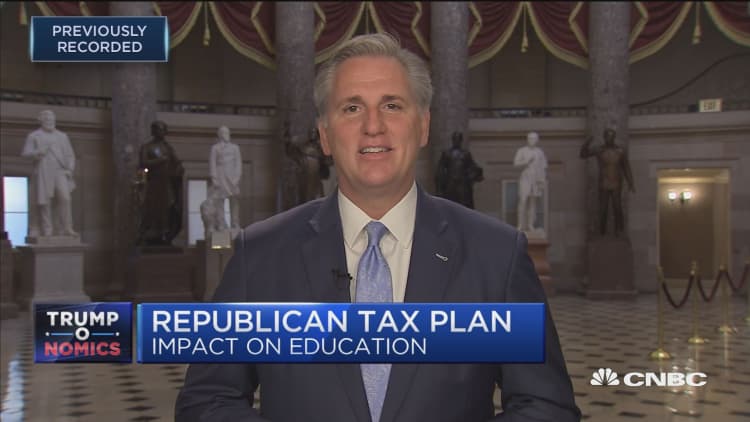
As House and Senate Republicans get set to nail down a final tax bill, House Majority Leader Kevin McCarthy outlined what he wants to see in the plan.
The Senate early Saturday passed its tax bill, which contains key differences from one approved by the House last month. This week, the House and Senate are expected to vote to go to a conference committee, where lawmakers will hash out a final proposal that both chambers will need to pass.
To do so, lawmakers will need to compromise on multiple key differences between the bills. McCarthy told CNBC's "Squawk Box" on Monday where he stood on some of those issues.
- Corporate alternative minimum tax: In a final rush to pass its plan, the Senate restored a corporate alternative minimum tax, which it initially proposed to eliminate. The House proposal would scrap that tax. McCarthy took a hard line. "I think that has to be eliminated because that would destroy [research and development]. ... That should be eliminated for sure."
- Individual tax rates: The House plan would collapse the current seven individual tax brackets into four but keeps the top rate at 39.6 percent. The Senate bill would keep seven brackets and drop the top rate to 38.5 percent. "I think we can work that out," McCarthy said of the bracket differences. He added that he "would actually like to see the rates go even lower, if possible."
- Mortgage interest deduction: The Senate plan would not make significant changes to the mortgage interest policy, keeping the $1 million deduction cap. The House bill would cap the deduction at $500,000 in home loans. McCarthy said "I think we would have to adjust" the House policy and "let that move a little higher."
- Estate tax: The House bill would double the exemption for the so-called death tax and then eliminate it starting in 2024. The Senate plan would would double the exemption but leave the tax in place. "I think we'll find a common ground in there," McCarthy said.
McCarthy's stances open up new questions about how to pay for the tax plan. Scrapping the corporate alternative minimum tax and cutting individual rates more dramatically would leave even less revenue going to the government than under the Senate proposal.
The Senate bill would increase budget deficits by nearly $1.5 trillion over 10 years, according to the congressional scorekeeper Joint Committee on Taxation. An earlier, slightly different version would boost deficits by more than $1 trillion even after modest economic growth is taken into account, the committee estimated.
One GOP senator — Bob Corker of Tennessee — defected over budget deficit concerns. Multiple other senators expressed fears about deficits before ultimately supporting the plan.
On Monday, McCarthy signaled that Republicans could take care of the deficit issue by making changes to programs like Social Security, Medicare or Medicaid. Those social safety net programs account for most federal spending.
"I worry about deficits, but you're not going to get out of this problem until you grow the economy. Then, you've got to look at the entitlements," McCarthy said.


